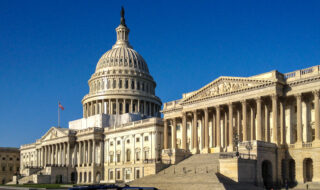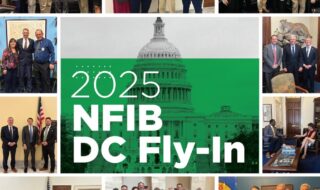April 6, 2022
NFIB Stands Against Government Overreach in Court
From coast to coast, in both state and federal courts, the NFIB Small Business Legal Center serves as the voice of small businesses in the nation’s courts. A single court decision can make or break a small business’ livelihood, so we fight hard to defend your rights wherever they’re in danger. Recently, NFIB filed amicus briefs supporting plaintiffs who have challenged government overreach in court.
“Federal, state, and local governments took unprecedented actions during the pandemic,” said Karen Harned, Executive Director of NFIB’s Small Business Legal Center. “The NFIB Small Business Legal Center has been on the front lines in state and federal courts, and even the U.S. Supreme Court, in those cases where we think a government or its officials overstepped their constitutional authority.”
West Virginia, et al., v. Department of the Treasury
On April 1, NFIB filed an amicus brief supporting West Virginia’s challenge to a provision of the American Rescue Plan Act of 2021 (ARPA), which prevents states from directly or indirectly providing much-needed tax relief. NFIB filed the amicus brief with the U.S. Chamber of Commerce.
The case, filed before the United States Eleventh Circuit Court of Appeals, concerns a provision of ARPA that makes federal funds available to states if and only if states agree to not pass any laws or take any administrative actions that decrease their net revenue, whether that decrease comes through tax credits, rebates, reductions in tax credits, or new and expanded deductions. NFIB argues the tax mandate is unprecedented and unconstitutional and urges the court to affirm the district court’s permanent injunction.
“Congress passed the American Rescue Plan to help ease local communities from the financial damage caused by the COVID-19 pandemic,” said Harned. “Unfortunately, the tax mandate provision prevents states from easing tax burdens on small businesses and limits options to support economic activity.”
Since Congress passed this tax mandate a year ago, the Legal Center has filed briefs in numerous cases across the country challenging it.
Jeffrey Becker v. Dane County
In February, NFIB filed an amicus brief at the Wisconsin Supreme Court in a case concerning violations of individual liberty by branches of government exercising core powers reserved for another branch. In this case, plaintiff argues that the Dane County Health Department, which is run by unelected bureaucrats, overstepped its authority by issuing a series of emergency orders that severely restricted the freedoms of Dane County citizens. NFIB filed the amicus brief with the Pacific Legal Foundation.
“The recent broad emergency orders issued by state executives in response to the COVID-19 pandemic demonstrates the need to revise the non-delegation doctrine to give meaning to the separation of powers,” said Harned. “Small businesses were often left in a worse position than bigger competitors due to the emergency powers that restricted and regulated small business operations.”
“This case reveals the harm of government overreach when one branch of government yields unilateral orders,” added Bill G. Smith, NFIB Wisconsin State Director. “Small business owners vote in elections at every level of government, and these sweeping and broad orders needed to be voted on instead of issued through the executive branch.”
The NFIB Small Business Legal Center protects the rights of small business owners in the nation’s courts. Nationwide, NFIB is currently active in more than 40 cases in federal and state courts and in the U.S. Supreme Court.?
NFIB is a member-driven organization advocating on behalf of small and independent businesses nationwide.
Related Articles













